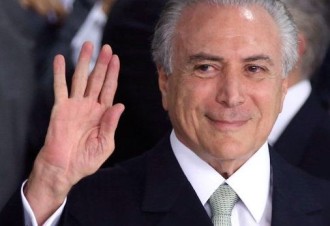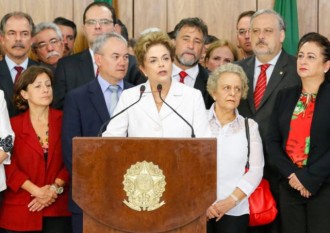

Business Friendly Messy Legacy
Brazil’s interim president brings hope for local and foreign investors as reported by Latinvex in this very comprehensive article.
Although he faces Brazil’s worst economic crisis in more than two decades, the country’s new interim president Michel Temer is bringing hope to both local and foreign investors due to his pledges to improve the business environment after nearly five years of catastrophic policies by Dilma Rousseff, who was suspended as president on May 12.
Temer aims to reduce the huge deficit, which now is 10 percent of GDP, through a combination of austerity measures and pro-growth policies.
The austerity measures include an overhaul to the pension system, while pro-growth policies include reforming the tax and labor regulations as well as allowing more foreign ownership in the economy.
While details on other policies are yet to be announced, he is also expected to replace Rousseff’s largely protectionist policies with more trade-friendly measures.
Added together, these policies should stop the economic paralysis and start recharging economic growth, business executives and experts say.
“There is a consensus in the private sector that this is needed for Brazil, a crucial step to move forward in order to modernize the country and be more competitive as well as be more attractive for foreign investments,” says Rogério Menezes, the CFO for Brazil, Argentina and Chile for Smurfit Kappa and a prominent critic of Brazil’s infamous tax system.
John H. Welch, Managing Director for Macro Strategy at CIBC Capital Markets, echoes that sentiment. “They will help, especially on foreign trade and investment,” he says about the new policies.
Welch expects to see an improvement towards the end of this year and next year, while Menezes says the benefits may come immediately in many areas.
“Expectations are high that we can see measures with immediate effect,” Menezes says. “However considering the regular cycles for approving plans, I would say that some results will be noticed quickly and a few others will be seen within 1 to 3 years.”
Before the change of government, the International Monetary Fund predicted a 3.7 percent decline in GDP this year. However, several private economists are now revising up their forecasts and see the possibility of growth this year.
ROUSSEFF’S LEGACY
“I may have made mistakes but I did not commit any crime,” Rousseff said after she was suspended.
She is right on the first statement and wrong on the second.
Let’s look at the errors she made that led Brazil to its worst economic crisis in more than two decades.
After inheriting a booming economy from her predecessor, Luiz Inácio Lula da Silva, in January 2011, Rousseff implemented policies that even her fellow leftist Lula had avoided.
With the exit of both Lula and his well-respected central bank president Henrique Meirelles, Rousseff and her leftist finance minister Guido Mantega started to meddle in the economy while ramping up anti-business rhetoric.
In one of the earliest moves, Rousseff and Mantega sent shockwaves through the business community after they used the government’s golden share in hugely successful mining giant Vale to out its well-respected CEO Roger Agnelli in May 2011.
In a Harvard Business Review ranking of the world’s best-performing chief executive officers published in February 2013, Agnelli came fourth, only behind Apple Inc’s Steve Jobs, Amazon.com Inc’s Jeff Bezos and Samsung Group’s Yun Jong-Yong. He was the top mining CEO in the 100-executive ranking.
Agnelli’s sin? Following business principles rather than the nationalist policies of Rousseff.
As the commodity boom started to end – due to China’s economic slowdown – Rousseff’s statist policies started to impact local and foreign investments even more. The buoyant optimism from the Lula years was starting to be replaced by growing pessimism.
After growing an average of 4.1 percent during Lula’s eight years in power (including a 25-yar high of 7.5 percent in Lula’s last year), GDP under Rousseff’s five years in power has grown a dismal 1 percent, according to Latinvex analysis based on data from the International Monetary Fund (IMF).
That includes a 3.8 percent GDP decline last year (the worst result in 25 years).
Meanwhile, inflation has also been growing, due to the government’s statist policies and reached 9 percent last year (the highest in 20 years).
Unemployment has passed the 10 percent mark as 1.8 million companies closed last year.
After winning its much-coveted investment grade in 2008, Brazil lost it under Rousseff.
Most serious of all: Rousseff may be leaving behind a secret deficit of between 250 billion reais (US$71 billion) and 600 billion reais, according to Folha de S. Paulo and other Brazilian media.
The secret deficit, if true, should come as no surprise. Rousseff committed plenty of shady actions surrounding her re-election in 2014.
In fact, her removal is directly tied to accusations that she broke budget laws to boost spending in the run-up to the election. That is the crime she did commit.
CHALLENGES
Apart from dealing with the deficit, Temer must also deal with the mess at state oil giant Petrobras, which has been marred in Latin America’s largest corruption scandal thanks to a scheme whereby Rousseff’s Workers’ Party partly financed its campaigns and expenses through money illegally gained from bribes companies paid to win contracts at the oil company.
Another key challenge is to get the necessary reforms approved by Congress, which consists of 25 different parties.
“The challenge will be to get them approved in Congress and then to ensure that the needed changes are implemented,” says Alberto Bernal, Chief Global and EM Strategist, XP Securities.
However, unlike Rousseff, who was notorious for her treatment of lawmakers, Temer is seen as more willing to work with Congress to get majorities for his reforms.
“The faster the reforms are approved, the faster credibility will return, and hence, the faster the economic turnaround will come,” Bernal says.
Fernando Henrique Cardoso, Brazil’s widely-respected president between 1995 and 2003, told CNN en Espanol that the key to a recovery was to provide confidence to investors.
That confidence clearly has been created with the exit of Rousseff and a business-friendly government in her place.
While the road ahead will be difficult, there is no doubt that the combination of business-friendly policies and a business-friendly team will help get Brazil out of the mess left behind by Rousseff.